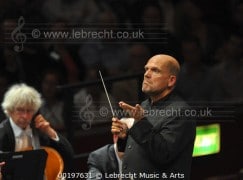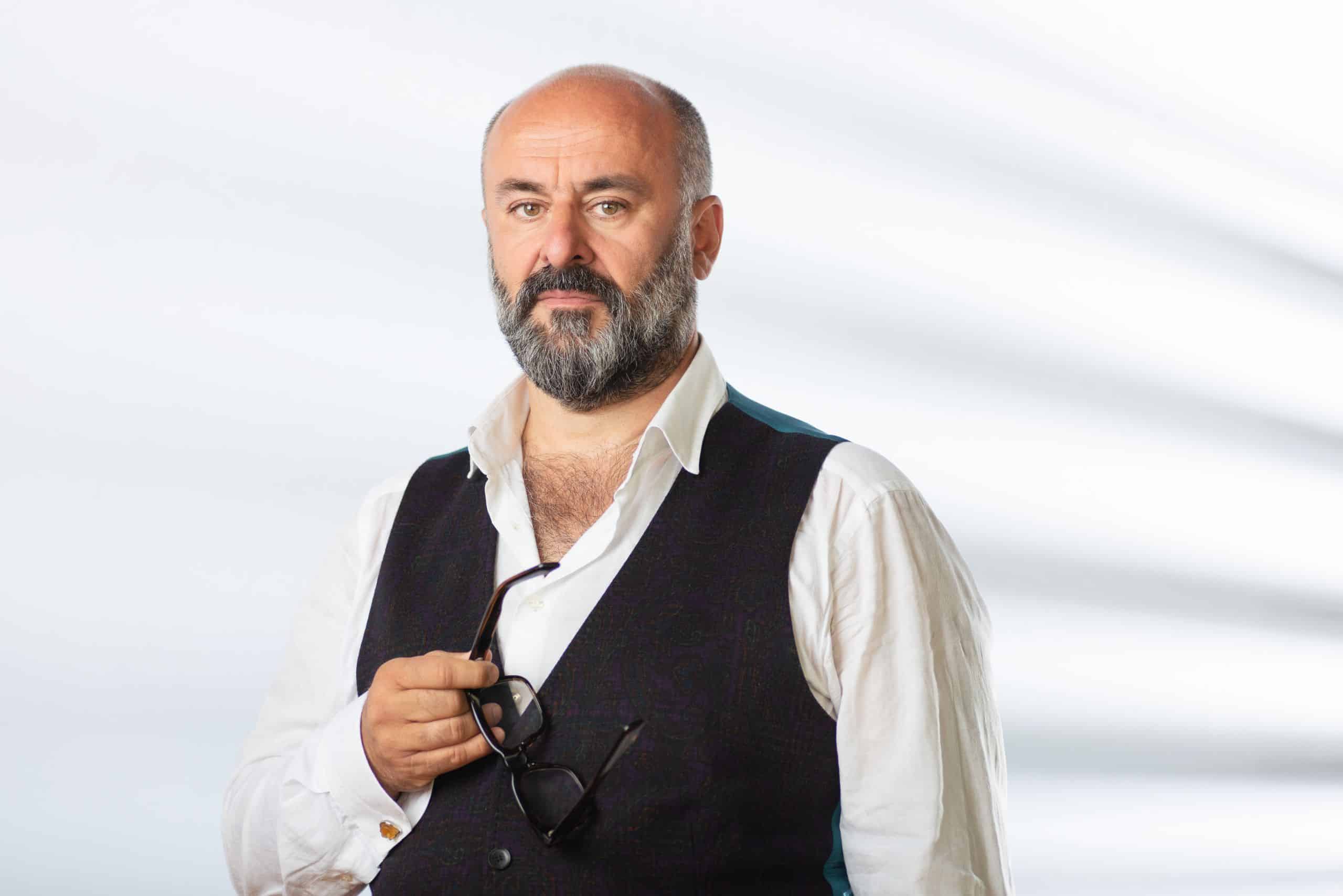Jaap Van Zweden cancels concert at 20 minutes notice.
mainJust in from a correspondent in Dallas:
Assistant conductor Karina Canellakis stepped in at the last minute tonight to lead the Dallas Symphony in Shostakovich’s massive ‘Leningrad’ Symphony after music director Jaap van Zweden had to cancel – literally 20 minutes before curtain – in order catch a plane to Amsterdam and attend to a family medical emergency.
The performance was spectacular! Van Zweden prepared the orchestra himself in rehearsals this week, so Canellakis probably hadn’t stepped in front of the orchestra at all until tonight’s performance. But she navigated a big, sprawling symphony loaded with frequent meter changes and did it with clear, precise, sweeping command as if she’d been living with this music for years.
Van Zweden is the next music director of the New York Philharmonic.






And Karina Canellakis the next musical director of Dallas’ Symphony…:):):)
Jaap the media buff could have played this very well… 😉
Anyway, just in case, all the best to his family, may it turn out to be nothing too serious.
Hopefully San Diego will be faster at making her an offer…
She is very cute, but as with most women heavy on the American accent, as soon as she opens her mouth and that guttural gurgling sound emerges, the attractive woman is gone. But maybe she just is versatile and knows how to blend in.
https://www.youtube.com/watch?v=hTBXs7oBBWU
Now lets hope she also gets a bit time to actually grow, before the media hyenas devour her as soon as she enters the spotlight. She is talented, but for from being accomplished.
Brava, Karina. It’s interesting to note that her Masters in conducting is from Juilliard where she studied with Alan Gilbert. I know that NL will keep us posted on her progress.
Brother Nick, a fine cellist, is on Lincoln Center’s Chamber Music Society roster.
The days of 25-year-old-Leonard-Bernstein-steps-in-for-Bruno-Walter-at-the-last-minute-and-makes-front-page-of-New-York-Times are over.
2016 is light years from 1943, today 25 year olds are regular guest conductors at Berlin, Vienna, conducting Mahler from memory…
“Conducting Mahler from memory” is easy. Playing it from memory would be something.
It depends, but sometimes it’s just a vanity thing. Possible, because the conductor doesn’t produce any sound himself. In opera, where the conductor really matters, nobody conducts without the score, because it would be just silly…
So Nello Santi and Daniele Gatti are silly?
And Karajan before them. And Barenboim Today.
And Toscanini (who was short-sighted and did not want to wear glasses) ! Had a couple of memory lapses in his old days, though
Yes, conducting opera without a score is silly. No matter how well you know the piece.
What a crazy comment: ‘conducting Mahler is easy’. It is one of the MOST difficult music types to conduct, because of the psychological complexities and diversity of material, which demands a very broad range of both technique and interpretative intuition.
I don’t argue that, I was more in the line of conducting is ALWAYS easier than actually playing it. I think most good conductors would actually prefer to play an instrument. Many conductors on the circuit started as instrumental musicians, but when they realized that they can make MUCH more money by conducting, it made them try the conducting road and stay there. There is more to it but that’s the short version.
To play a part within a score as a player is so different from getting 90 people in line with a coherent musical vision, I woud not know where to begin to explain the difference. A short version could be: conducting is more than time beating, it is creating the score as such. I have worked with conductors, some were bad, some were good, and it is very easy to produce a bad performance of whatever piece. But to really bring a score to life, a thorough musical vision and complete understanding of the workings of an orchestra is necessary, together with a thorough understanding of the music, and that is a very sophisticated art form. No player could ever have the overall view of the total sound like a conductor must have, and he must be able to know exactly where problems are on rehearsels, in terms of intonation, ensemble playing (to play together), homogenizing chordal entries, etc. etc. And this is merely the top of the iceberg. So, that comment is just silly and completely uninformed.
John, I know all that. very very well actually, probably better than you… Still…
Your idealistic version is faaaaaar from happening in 99% of the real world classical music biz.
In a word: rubbish.
I am old and toothless and getting a little senile. Please remind who these 25 yo geniuses are who are currently guest conducting in Berlin and Vienna and conducting Mahler from memory. I can’t think of even one. There are many conductors of stature today who always have the score in front of them: Muti, Jansons, Nelsons, van Sweden, etc. Ozawa always had the score (usually closed) in front of him. IMHO, conducting a great orchestra “without the music” is not a big deal. As the late Colin Davis once said to an orchestra with a twinkle in his eye: “How can I possibly follow you if you don’t play together…”
Karina Canellakis is in her 30s, I believe, and probably will have a bright future on the podium with the support of several influential mentors who recognize her talent. It took Bernstein 16 years after his “discovery” when Bruno Walter fell ill to land a major position (NYPhil 1958-1969).
Conducting opera without a score on the stand is not advised, in case of difficulty, but a number of conductors have left them untouched. It is certainly a risk. Carlos Kleiber famously would leave his unopened, and at the start of Fledermaus in Munich (caught on video), someone had left a red rose on top of it which was still there at the end. However, HE knew everything inside out and back to front!
I ought to redact the first sentence as factually inaccurate.
Very likely engineered. Just like with Daniel Harding back then in Berlin when Abbado suddenly “fell ill” just before the concert when he had looked very well in the morning’s dress rehearsal, and Harding just happened to have his tails with him and know the whole program from memory…
Of course, a half-decent assistant conductor WOULD be prepared to conduct and have all his equipment, tails included. That’s part of their job description.
In Germany there is no such tradition of assistant conductors, like in the US. It might have to do with the higher density of musicians per capita, so when a conductor falls ill, you usually find a replacement the same day, unless for very specialist repertoire. Probably not within 20 minutes though.
I don’t know about Harding/Abbado, but assume their “deal” was that Harding was sticking around as an apprentice to the master, nothing formalized.
Amazing performance last night!! I was fortunate to be in attendance and Ms. Canellakis handled the orchestra superbly!
Shouldn’t be a surprise as I’m sure she knows both pieces as well as VZ, but still somewhat of a shock to have to step in on 20 minutes notice!
My husband and I were both Karina and Nick Canellakis’ host family when they were students at The Curtis Institute. Both are fine, fine musicians, and equally fine individuals. We’re so happy to see them doing well.
With all due respect, if Maestro van Sweeden did all of the preparations and left twenty minutes before, he is probably the reason it went well. I spent a decade taking over concerts and operas from various maestri, and when the person I took over from was good, the result was strong, and when less prepared, it was far more difficult. One has to be realistic: it’s easy to conduct “Heldenleben” in Philly with no rehearsal, difficult to do it in six in Springfield. For me it was more about Sweeden’s dogmatic preparation.
Only time will tell. I watched a maestro on the rise be hissed by the orchestra when he jumped in at a famous theater, he continued to rise but finally hit the limits of what he could do.
She directed the Arizona State University student orchestra in a terrific, moving, and beautiful performance of the Mahler 9th a while back. She will be a Mahler conductor to reckon with.
She was very impressive at Tanglewood, when we saw her.
And how was the music? Or did you only see her?
RE: conducting from memory: years ago, when I was a student, I sang in the chorus of Scottish Opera’s Don Giovanni in the Edinburgh Festival. Barenboim conducted it from memory AND played all the recitatives from the harpsichord – from memory!
Just for clarification, it was not Scottish Opera’s Don Giovanni. The Director of the Festival, Peter Diamond, had mounted the production with the Chorus being hired from Scottish Opera. Barenboim had never conducted Scottish Opera.
Thanks for the clarification! My memory is a bit hazy now (it was 45 years ago). The stage direction was by Peter Ustinov, in 1971 or 72 – but my memory of Barenboim’s memory is still as clear as if it were yesterday!
The late Giuseppe Patanè would often rehearse from memory – he knew all the rehearsal numbers in a huge range of scores…
And I believe also conducted from memory. At any rate, his eyes were focused on the stage and he mouthed all the words with the singers never looking down.
maybe NY Phil should have considered Gergiev.
He commands a private plane, and doesn’t have to ditch the team in a rush to catch the last bloody commercial flight out of town.
Gergiev is a guess conductor, as explained elsewhere on this site. You never know whether he will turn-up or not.
Another report says “less than 24 hrs notice,” not 20 minutes.
http://goo.gl/WMFest
Well, that’s not a contradiction.
Never knew a journalist to be so understated and non-dramatic, to ignore that it was twenty minutes’ notice and call it “under 24 hrs.”
Could be that Texas newspapers are not interested in conveying drama, but I doubt it.